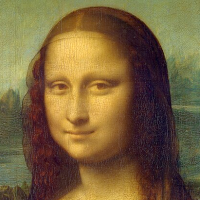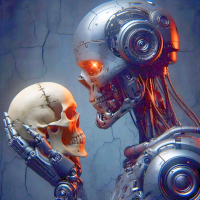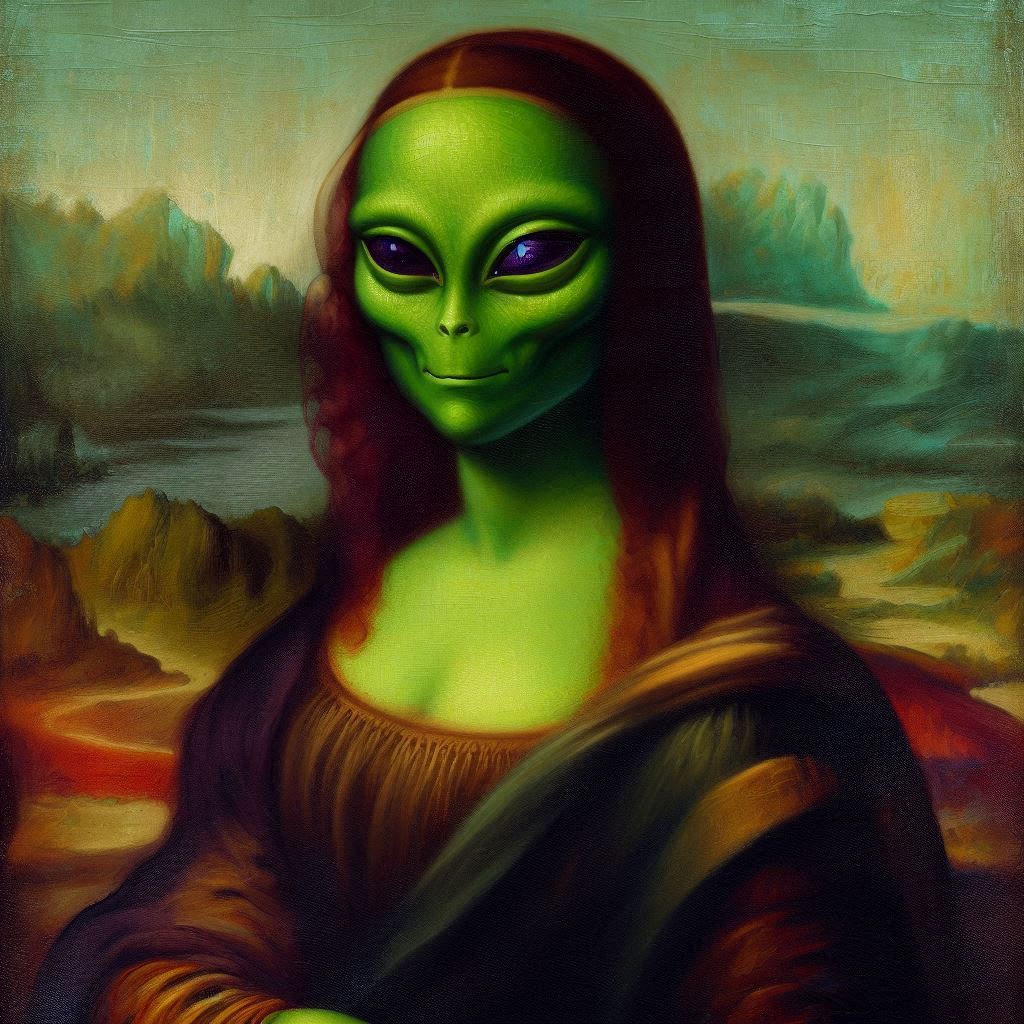- About Us
- Columns
- Letters
- Cartoons
- The Udder Limits
- Archives
- Ezy Reading Archive
- 2024 Cud Archives
- 2023 Cud Archives
- 2022 Cud Archives
- 2021 Cud Archives
- 2020 Cud Archives
- 2015-2019
- 2010-2014
- 2004-2009
 |
Shooting the Bull: |
All right, folks, let's talk about the big, hairy beast lurking in the shadows of our creative realms: artificial intelligence (AI). Yeah, I know, it's all the rage nowadays. But have you ever stopped to ponder whether these algorithms could one day be cranking out Shakespearean sonnets or painting the next Mona Lisa? It's a wild thought, for sure.
Now, before we start envisioning a dystopian future where robots run the art galleries and literature festivals, let's take a moment to appreciate the sheer awesomeness of human creativity. I mean, have you ever seen a painting by Picasso or read a novel by Toni Morrison?
robots run the art galleries and literature festivals, let's take a moment to appreciate the sheer awesomeness of human creativity. I mean, have you ever seen a painting by Picasso or read a novel by Toni Morrison?
That stuff hits you right in the feels, doesn't it? That's the magic of human ingenuity, my friends.
One thing that sets us humans apart from our silicon buddies is our knack for originality. We're like snowflakes: each one of us a unique blend of experiences, emotions, and quirks. And let me tell you, there ain't no algorithm out there that can replicate the messy brilliance of the human mind. Sure, AI can churn out some decent imitations, but it's like comparing a photocopy to the real deal. There's just no substitute for the real thing.
And let's not forget about the depth and complexity of human creativity. We're not just painting pretty pictures or stringing together words; we're diving headfirst into the murky depths of the human psyche. From exploring the meaning of life to dissecting the absurdity of existence, humans have been grappling with the big questions since, well, forever. And while AI might be able to crunch some numbers and spit out a few theories, it's like trying to teach a goldfish to do calculus. It's cute, but it ain't gonna change the world.
I'm a big believer in gut feelings and intuition—you know, those lightbulb moments when inspiration strikes out of nowhere. As it turns out, AI doesn't have a gut to trust or a heart to follow. It's all logic and algorithms, which is great for balancing your budget or finding the best route to work, but kinda falls short when it comes to tapping into the mysteries of the human soul. Sorry, AI, but you just can't teach a machine to dream.
Of course, that's not to say that AI doesn't have its perks. I mean, who wouldn't want a personal assistant that can organize your life and order pizza with just a voice command? But when it comes to the really important stuff—like creating art that moves us to tears or wrestling with the complexities of human existence—we humans still reign supreme.
So, as we hurtle into the brave new world of AI-powered everything, let's remember to keep one foot firmly planted in the realm of human creativity. Let's cherish the messy, beautiful, unpredictable essence of what it means to be human. After all, robots may be able to mimic us, but they'll never be able to truly understand what it means to be alive.
* * *
I am David M. Fitzpatrick. You might have read my work on The Cud, as I’ve been writing here for about 13 years. But you didn’t read it just now, because everything above was written by an AI.
When I was a computer programmer in my teenage years in the mid-1980s, I used to have this thought experiment that I mulled over constantly: How would I write software that could write fiction? I never intended to actually program it; it was just a way for me to think logically about the complex processes I’d need to take to work it out. I believed then that, one day, machines would be able to pull it off. Like legalized marijuana, naughty words on broadcast television, and commercials with women modeling underwear, I didn’t think it would happen this quickly. Unlike all of those examples, AI-generated content is far more serious.
If you think that AI won’t take over creative endeavors, think again. Look how good it has gotten in the last few years. What will it be capable of in five years? In ten? In twenty-five? In a century? The AI that wrote the article above made a crack about AI taking over art galleries. Should we be worried? Publishers, after all, publish what they can sell—no matter how bad it is.
How close are we to an AI-run dystopia? It’s writing content and making artwork now. Will it ever become Skynet? That seems absurd, I know, but in a recent chat with an AI, I got it to admit that an AI-run planet, where the machines eradicated humans, was a logical thing to do. It might seem like sci-fi, but if we get to a point where AI is conscious, all bets are off.
* * *
The AI that wrote that it was a wild thought to imagine AIs “cranking out Shakespearean sonnets.” Here’s one in that style. I think you know that I didn’t write it. I just told it to write an original sonnet in iambic pentameter in the style of Shakespeare. It did so in seconds. The theme and title were its choice. How fitting that the theme and title is about hope. We need it, but we need more action than hope.
Hope’s Beacon
In shadows cast by moon's soft gentle glow,
Where whispers dance upon the midnight air,
A solitary figure, lost in woe,
Beside the sea, with burdens hard to bear.
With heavy heart and tear-stained eyes, he weeps,
His sorrows echoed by the ocean's sigh,
As waves embrace the shore in rhythmic sweeps,
A solemn dirge beneath the starlit sky.
Yet midst the darkness, hope begins to bloom,
A beacon shining through the darkest night,
For in the heart of sorrow, there is room,
For love to mend the broken and ignite.
So let us cling to hope, however faint,
For in its light, we find our truest saint.
The small Shakespeare and Mona Lisa images illustrating the AI’s part of the story were made by real humans. To the best of my knowledge, the pic of the robot head was made by a human (user myshoun via Pixabay).
But the AI also made a joke about “painting the next Mona Lisa.” Well, here it is, in mere seconds, with my only guideline to make it an alien face with the same mysterious smile. If you’re not worried, you should be.

David M. Fitzpatrick is a fiction writer in Maine, USA. His many short stories have appeared in print magazines and anthologies around the world. He writes for a newspaper, writes fiction, edits anthologies, and teaches creative writing. Visit him at www.fitz42.net/writer to learn more.
